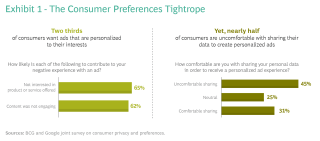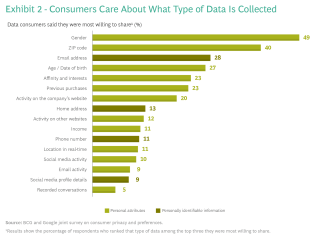With a privacy-first approach to data-driven marketing, companies can build trust with consumers and create lasting value, new research from BCG and Google shows.
Marketers today face a tricky paradox: on one hand, the fight for customer attention requires ever more relevant messages tailored to people’s interests at the moment they are most interested. On the other hand, customers are increasingly concerned about providing the data marketers need to create those experiences.
This forces successful marketers to become tightrope walkers, balancing consumers’ discomfort with sharing personal information and their general desire to have familiar, frictionless experiences with the brands they care about. (See Exhibit 1.) And while walking that fine line, marketers must be ready for what’s next: staying ahead of platform changes due to third-party cookie deprecation and tightening global data regulations.
To explore the perils inherent in this balancing act—and to learn how companies can adopt pro-privacy policies that create real value—BCG partnered with Google, expanding upon our prior research on data strategy by surveying consumers and interviewing nearly three dozen marketers at major companies. We set out to uncover how consumers feel about the way their data is collected, what data they are willing to share, and which uses of data they are comfortable with or even prefer. And we asked marketers how they are responding to these evolving consumer sentiments.
The results were clear: while many marketing teams are still struggling to find the right way to reach their consumers online, successful marketers take a consumer-centric approach to data collection across their organizations—and they take proactive steps to build trust with consumers by demonstrating their concern for data privacy.
Consumers First
We surveyed more than 1,000 consumers in the US and Canada in August 2021 and found that three things matter most to them:
- What data is being collected?
- Why it is being collected? (In other words, what will it be used for?)
- How is the data collected—and is there a clear value exchange offered?
What data is collected. There are certain types of data that people tend to be more willing to share. (See Exhibit 2.) For instance, respondents said they are more likely to share their gender, age, zip code, and email addresses with a specific company than their phone number, location, or online browsing activity. Consistently, respondents said they are least comfortable with companies recording their conversations.
These results vary significantly across consumer segments, however. (See Exhibit 3.) For example, new parents are…




